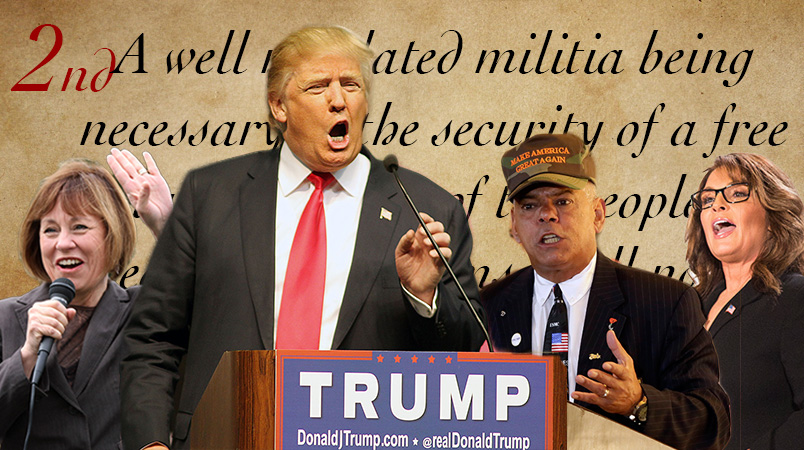

Donald Trump’s remark Tuesday that “the Second Amendment people” might take out a President Hillary Clinton to stop her from appointing liberal Supreme Court justices fits a now-familiar pattern: Trump takes an idea that has been simmering at the fringes of the hard right and shouts it from his platform as the GOP presidential nominee.
His campaign disputed the interpretation that the remark, delivered in Trump’s typical off-the-cuff style, was some sort of call-to-arms or that it alluded to assassination. But scholars who study gun rhetoric in political discourse, as well as gun safety advocates at the front lines of the gun control debate, placed his comment in the context of a long lineage of language pitting gun holders as the last defense against a tyrannical government.
“In anti-government circles, and even in hate group circles, where this idea of ‘Second Amendment remedies’ is not a joke, who knows how that is going to be perceived,” said Ryan Lenz, the editor of Southern Poverty Law Center’s Hatewatch blog.
“In reality, in the past, we’ve seen it being perceived as a sizable influx of support and validation for ideologies that, up until this campaign, had no place in mainstream political discourse,” Lenz told TPM.
Trump is no stranger to the gun debate and has hit on hot button issues such as eliminating gun-free zones and suggesting that victims of gun violence would have been able to defend themselves had they been armed. His Tuesday remark came after his usual stump-speech warnings about the type of anti-gun judges he says Clinton would appoint if she was elected.
“If she gets to pick her judges,” Trump said, “nothing you can do, folks. Although the Second Amendment people, maybe there is.”
Some, including House Speaker Paul Ryan (R-WI), have tried to brush off the GOP nominee’s comment as a joke, albeit one that didn’t quite land. Trump has described even his own popularity in violent terms: “I could stand in the middle of 5th Avenue and shoot somebody and I wouldn’t lose voters,” he said at a rally in January.
Those around Trump have also invoked gun violence as a response to his Democratic rival. Al Baldasaro, a Trump advisor and New Hampshire legislator, said last month that Clinton “should be put in the firing line and shot for treason” —a comment Trump spokeswoman Hope Hicks said the campaign “disagreed” with even as she thanked Baldasaro for his “support.”
This time around, the campaign’s defense of Trump’s “Second Amendment people” line has been all over the place. Some allies say he meant that gun rights supporters would stop Clinton with their votes, others claim he was referring to the formidable lobbying power of the NRA, while some surrogates blamed the line on Trump’s “inarticulate” manner of speaking.
But, like the language Trump has deployed to discuss immigration, “rigged” elections and Muslims, his rhetoric around Clinton and the Second Amendment wasn’t born in a vacuum. Trump is perhaps the most prominent of a series of conservative politicians who’ve toyed with the idea that gun owners may need to resort to violence against an oppressive government.
In 2010, former Alaska Gov. Sarah Palin (R) posted on social media “Don’t Retreat, Instead – RELOAD!” while pointing to a list of Obamacare-supporting lawmakers.
During her 2014 campaign, freshman Sen. Joni Ernst (R-IA) said she believed in her right to carry guns to defend herself “whether it’s from an intruder, or whether it’s from the government, should they decide that my rights are no longer important.”
Failed 2010 Senate candidate Sharron Angle (R-NV) warned that “if this Congress keeps going the way it is, people are really looking toward those Second Amendment remedies.”
And Rep. Debbie Wasserman Schultz’s (D-FL) congressional challenger in 2009, Republican Robert Lowry, shot at a human-shaped gun range target with Wasserman Schultz’s initials written on it.
Brett Lunceford, a former professor who has researched the political discourse around guns, said these sort of remarks and actions feed into a belief that “the Second Amendment was put in place to overthrow the government if need be.”
“[Trump’s] throwing a bone to that mythology, that, if the government is tyrannical, ‘Well you guys are the ones that can do something about it,’” Lunceford told TPM. “There’s this idea that they’re the ones that can stop tyranny. It’s not about self defense, it’s about defense from the government.”
Gun control advocates say that purveyors of such language take their cues directly from gun industry lobbying groups. Shannon Watts, founder of Moms Demand Action for Gun Sense in America, pointed to NRA Board member Ted Nugent—who has said President Obama, Hillary Clinton and other Democrats should “suck on my machine gun”—and to Gun Owners of America executive director Larry Pratt, who in June said voters may “resort to the bullet box” if they don’t like Supreme Court decisions.
“We have seen the radicalized behavior of the NRA leadership, also impact lawmakers and other gun extremists to speak in rhetoric that is dangerous,” Watts said. “The Second Amendment is not a suicide pact. It’s not a manual for vigilante justice.”
For victims of gun violence themselves, Trump’s comment had a very specific and acute connotation.
“Responsible, stable individuals won’t take Trump’s rhetoric to its literal end, but his words may provide a magnet for those seeking infamy. They may provide inspiration or permission for those bent on bloodshed,” former Rep. Gabby Giffords (D-AZ) said in a statement with her husband, Mark Giffords.
Giffords was shot in the head in 2011 in an assassination attempt while meeting with constituents in Tucson.
“What political leaders say matters to their followers. When candidates descend into coarseness and insult, our politics follow suit. When they affirm violence, we should fear that violence will follow,” Giffords said in the statement.